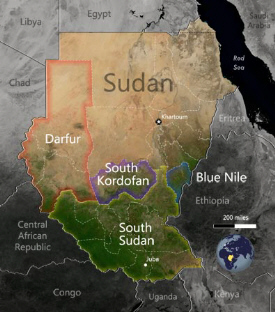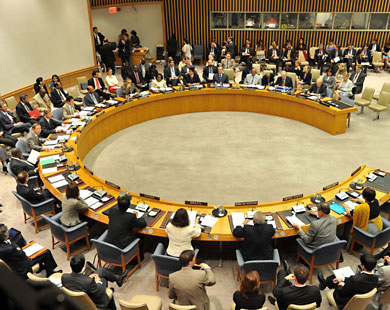The United Nations Security Council (UNSC) started deliberating on a draft resolution introduced by the United States calling for implementation of the African Union (AU) roadmap.
 The United Nations Security Council (UNSC) started deliberating on a draft resolution introduced by the United States calling for implementation of the African Union (AU) roadmap aimed at resolving disputes between north and south Sudan.
The United Nations Security Council (UNSC) started deliberating on a draft resolution introduced by the United States calling for implementation of the African Union (AU) roadmap aimed at resolving disputes between north and south Sudan.
The plan was adopted by the AU Peace and Security Council (PSC) during its meeting this week that discussed the fallout from the occupation of Heglig area by South Sudan before Sudan army managed to take it back a week ago, Sudan Tribune reported Friday.
The Pan-African body called for immediate return to negotiations, cessation of hostilities, activation of border monitoring mechanism, ending support to rebels and withdrawal of both countries’ troops inside the borders including from Abyei among other things.
It gave a three month deadline to reach an agreement on post-independence issues namely oil, Abyei, borders and citizenship.
The UNSC resolution proposed to be under Chapter VII threatens sanctions on Sudan and South Sudan if found violating the terms of the AU plan.
U.S. ambassador to the UN Susan Rice suggested that there is some resistance among UNSC members which may result in the resolution taking some time before being considered for vote.
 “We are members of the African Union. We respect everything that comes from the African Union. That doesn’t mean anything comes from the African Union or African Peace and Security Council being or to be exploited by certain members here in the Security Council and try to for their own sake,” Sudan’s UN ambassador Daffa-Alla Elhag Ali Osman told reporters today.
“We are members of the African Union. We respect everything that comes from the African Union. That doesn’t mean anything comes from the African Union or African Peace and Security Council being or to be exploited by certain members here in the Security Council and try to for their own sake,” Sudan’s UN ambassador Daffa-Alla Elhag Ali Osman told reporters today.
The ambassador expressed reservations and appeared critical of using Chapter VII of the UN charter in the resolution saying that Sudan’s understanding is that it should be directed to the “aggressor”.
Sudanese officials have given conflicting statements on their willingness to resume negotiations with Juba following the Heglig battles.
Sudanese president Omer Hassan al-Bashir ruled out any talks and said that South Sudan only understands the “language of the gun”.
"We will not negotiate with the South’s government, because they don’t understand anything but the language of the gun and ammunition," Bashir told Sudanese troops in Heglig earlier this week.
But Bashir’s foreign minister Ali Karti later said that negotiations could be restarted on security issues only and particularly on Juba’s alleged support to rebels fighting to topple regime in Khartoum.
Juba strongly denies supporting Sudanese rebels and accuses Khartoum of aiding insurgent in its territories.
